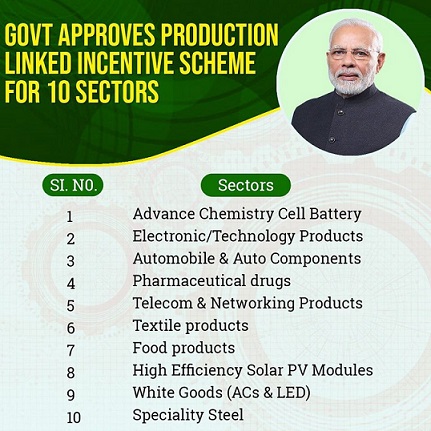By Our Correspondent
NEW DELHI/BHUBANESWAR: Union PNG-Steel Minister Dharmendra Pradhan and Jindal Steel and Power Limited Chairman and former Lok Sabha, MP, Naveen Jindal have welcomed the CCEA approval to introduce the Production-Linked Incentive (PLI) Scheme in the following 10 key sectors for Enhancing India’s Manufacturing Capabilities and Enhancing Exports – Atmanirbhar Bharat.The Union Cabinet chaired by the Prime Minister, Narendra Modi has given its approval to introduce the Production-Linked Incentive (PLI) Scheme in the following 10 key sectors for Enhancing India’s Manufacturing Capabilities and Enhancing Exports – Atmanirbhar Bharat.
“Thank the #CCEA chaired by Hon PM Narendra Modi for approving PLI scheme for 10 sectors, including steel.Driven by the vision of making India a global manufacturing hub, this step will attract investments, foster growth & employment and propel India on the path to self-reliance,” Union Minister Pradhan said.
“I also welcome the approval for continuation and revamping of scheme for VGF with a total outlay of ₹8100 crore to promote Public Private Partnerships in social and economic infrastructure projects.This will help in creation of social and economic assets as well as creation of a supporting ecosystem to improve services and infrastructure to achieve self-reliance in social sectors like, health, education and empower the people to partner in India’s growth,” he added.
“Welcome the announcement of Production-Linked Incentive Scheme in 10 key sectors. This is a good policy direction set by the Government to make India globally competitive and emerge as a manufacturing hub. #AtmaNirbharBharat,” JSPL Chairman, Naveen Jindal tweeted @MPNaveenJindal.
The PLI scheme will be implemented by the concerned ministries/departments and will be within the overall financial limits prescribed. The final proposals of PLI for individual sectors will be appraised by the Expenditure Finance Committee (EFC) and approved by the Cabinet. Savings, if any, from one PLI scheme of an approved sector can be utilized to fund that of another approved sector by the Empowered Group of Secretaries. Any new sector for PLI will require fresh approval of the Cabinet.
The PLI scheme across these 10 key specific sectors will make Indian manufacturers globally competitive, attract investment in the areas of core competency and cutting-edge technology; ensure efficiencies; create economies of scale; enhance exports and make India an integral part of the global supply chain.
ACC battery manufacturing represents one of the largest economic opportunities of the twenty-first century for several global growth sectors, such as consumer electronics, electric vehicles, and renewable energy. The PLI scheme for ACC battery will incentivize large domestic and international players in establishing a competitive ACC battery set-up in the country.
India is expected to have a USD 1 trillion digital economy by 2025. Additionally, the Government’s push for data localization, Internet of Things market in India, projects such as Smart City and Digital India are expected to increase the demand for electronic products. The PLI scheme will boost the production of electronic products in India.The automotive industry is a major economic contributor in India. The PLI scheme will make the Indian automotive Industry more competitive and will enhance globalization of the Indian automotive sector.
The Indian pharmaceutical industry is the third largest in the world by volume and 14th largest in terms of value. It contributes 3.5% of the total drugs and medicines exported globally. India possesses the complete ecosystem for development and manufacturing of pharmaceuticals and a robust ecosystem of allied industries. The PLI scheme will incentivize the global and domestic players to engage in high value production.
Telecom equipment forms a critical and strategic element of building a secured telecom infrastructure and India aspires to become a major original equipment manufacturer of telecom and networking products. The PLI scheme is expected to attract large investments from global players and help domestic companies seize the emerging opportunities and become big players in the export market.
The Indian textile industry is one of the largest in the world and has a share of ~5% of global exports in textiles and apparel. But India’s share in the manmade fibre (MMF) segment is low in contrast to the global consumptionpattern, which is majorly in this segment. The PLI scheme will attract large investment in the sector to further boost domestic manufacturing, especially in the MMF segment and technical textiles.
The growth of the processed food industry leads to better price for farmers and reduces high levels of wastage. Specific product lines having high growth potential and capabilities to generate medium- to large-scale employment have been identified for providing support through PLI scheme.
Large imports of solar PV panels pose risks in supply-chain resilience and have strategic security challenges considering the electronic (hackable) nature of the value chain. A focused PLI scheme for solar PV modules will incentivize domestic and global players to build large-scale solar PV capacity in India and help India leapfrog in capturing the global value chains for solar PV manufacturing.
White goods (air conditioners and LEDs) have very high potential of domestic value addition and making these products globally competitive. A PLI scheme for the sector will lead to more domestic manufacturing, generation of jobs and increased exports.
Steel is a strategically important industry and India is the world’s second largest steel producer in the world. It is a net exporter of finished steel and has the potential to become a champion in certain grades of steel. A PLI scheme in Specialty Steel will help in enhancing manufacturing capabilities for value added steel leading to increase in total exports.
The Prime Minister’s clarion call for an ‘AatmaNirbhar Bharat’ envisages policies for the promotion of an efficient, equitable and resilient manufacturing sector in the country.Growth in production and exports of industrial goods will greatly expose the Indian industry to foreign competition and ideas, which will help in improving its capabilities to innovate further. Promotion of the manufacturing sector and creation of a conducive manufacturing ecosystem will not only enable integration with global supply chains but also establish backward linkages with the MSME sector in the country. It will lead to overall growth in the economy and create huge employment opportunities.



























